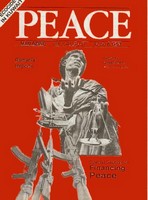
Peace Magazine Jul-Aug 1991, page 26. Some rights reserved.
Search for other articles by Norman Dyson here
Edited by Bonnie Green, James Lorimer & Company 1990 pp223. Reviewed by Norman Dyson
What have Canadian Church people been doing in the area of foreign affairs since World War II?
Bonnie Green, who participates in Project Ploughshares and is the director of the Office of Church in Society of the United Church of Canada, has collected and edited nine papers by prominent people in the field who outline a dramatic change in the approach the Churches have taken. The essays are uniformly excellent and provide insights from different perspectives.
A valuable feature is the inclusion at the end of the essays of three appendices. Appendix 1 contains excerpts from a brief by the CCC to the Special Joint Committee on Canada's International Relations, November 1985. Appendix 2 is a brief to the Minister of External Affairs on policy in Southern Africa by the CCC in July 1987. Appendix 3 outlines excerpts from a 1989 discussion paper on the international debt crisis for the Canadian Churches.
The Appendices show just how progressive, articulate, and sophisticated the Churches' views in foreign affairs have become.
The nine essays provide the background, and there is eloquence and almost unassailable logic contained in the Appendices.
In the very first essay, "The World Church and the Search for a Just Peace," Erich Weingartner discusses the ecumenical movements in this century. The deliberations at the first assembly of the World Council of Churches in Amsterdam in 1948 seems to have set a foundation for the Canadian Churches' approach ever since.
That first assembly that agreed Christians must ask God to teach them together to say "No" to every system that treats anyone as an irresponsible thing or as a means of profit; "No" to those who defend injustice in the name of order; "No" to those who sow the seeds of war or describe war as inevitable; and "Yes," to the peace-makers, to those who seek justice. "Although the full implications were not clear, they had together grounded their work in their religious faith, rather than back one of the competing political approaches to the world."
Robert Gardiner, in his essay, "Building a Counter-Consensus," outlines the development of "Ten Days for World Development," of which he was the first director, it grew out of his and the Churches' growing realization that structural, systematic change is required in the emerging and developing nations. Marjorie Ross, a former Presbyterian missionary in Africa, states:
"When we speak to government about Third world issues, we talk authoritatively about what we have learned from our partners about the realities of their countries. When we speak with those partners, and with each other, we know that we are a long way from having all the answers."
Renate Pratt's essay on "Corporate Social Responsibility" is a primer on effectively raising consciousness in government and on Bay Street regarding responsibilities to those oppressed in countries such as Namibia, South Africa, Chile and Guatemala.
Tim Ryan's paper, "The Good Samaritan Stops at the U.N.," illuminates the Churches' continuing efforts in the field of Human Rights at the U.N.
Political Scientist Robert Matthews assesses the Church's impact on Canadian Foreign policy as somewhat minuscule. He opines that "the Churches will have to content themselves with marginal changes wrung from government by means of amassing incontrovertible data on human rights abuses. The Church may choose to concentrate more time on public education, sensitizing Canadians to the Churches' cosmopolitan values and attitudes."
Personally, I think Matthews underestimates the Churches' effect on governments, but he may have something in suggesting more emphasis on public education about the churches' foreign policy position.
A well-informed public about the foreign affairs goes a long way to ensuring a sensible governmental foreign policy and a lasting peace.
"Canadian Churches and Foreign Policy" deserves wide distribution and readership.
Norman Dyson is a lawyer who works with Lawyers for Social Responsibility and Science for Peace.

Peace Magazine Jul-Aug 1991, page 26. Some rights reserved.
Search for other articles by Norman Dyson here